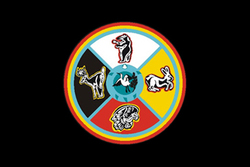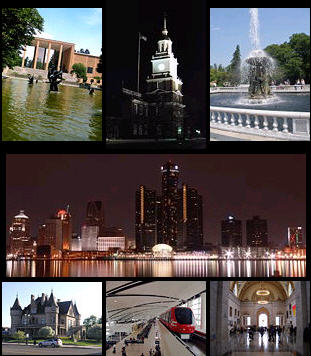
Native American gaming comprises casinos, bingo halls, and other gambling operations on Indian reservations or other tribal lands in the United States. Because these areas have tribal sovereignty, states have limited ability to forbid gambling there, as codified by the Indian Gaming Regulatory Act of 1988. As of 2011, there were 460 gambling operations run by 240 tribes, with a total annual revenue of $27 billion.

Arenac County is a county located in the U.S. state of Michigan. As of the 2020 Census, the population was 15,002. The county seat is Standish.

Standish is a city in the U.S. state of Michigan. The population was 1,458 at the 2020 census. It is the county seat of Arenac County.

The Isabella Indian Reservation is the primary land base of the federally recognized Saginaw Chippewa Tribal Nation, located in Isabella County in the central part of the U.S. state of Michigan. The tribe also has some small parcels of off-reservation trust land in Standish Township, Arenac County, near Saginaw Bay and southeast of the city of Standish. Tribal lands are held in trust by the federal government on behalf of the nation.

Saginaw Chippewa Indian Tribe of Michigan is a federally recognized band of Chippewa located in central Michigan in the United States.

The Soaring Eagle Casino & Resort, or simply Soaring Eagle Casino, is a Casino, Hotel, and Entertainment venue located near Mount Pleasant, Michigan. It is owned and operated by the Saginaw Chippewa Tribal Nation. Soaring Eagle Casino launched its Michigan online casino and online sport betting app, Eagle Casino & Sports, in 2022 in partnership with platform provider GAN.

The Sault Ste. Marie Tribe of Chippewa Indians, commonly shortened to Sault Tribe of Chippewa Indians or the more colloquial Soo Tribe, is a federally recognized Native American tribe in what is now known as Michigan's Upper Peninsula. The tribal headquarters is located within Sault Ste. Marie, the major city in the region, which is located on the St. Marys River.

Mohegan Sun is an American casino, owned and operated by the Mohegan Tribe on 240 acres (97 ha) of their reservation, along the banks of the Thames River in Uncasville, Connecticut. It has 364,000 square feet of gambling space.

The Iowa Tribe of Oklahoma is one of two federally recognized tribes for the Iowa people. The other is the Iowa Tribe of Kansas and Nebraska. Traditionally Iowas spoke the Chiwere language, part of the Siouan language family. Their own name for their tribe is Bahkhoje, meaning, "grey snow," a term inspired by the tribe's traditional winter lodges covered with snow, stained grey from hearth fires.

The Grand Traverse Band of Ottawa and Chippewa Indians is a federally recognized Native American tribe located in northwest Michigan on the Leelanau Peninsula. Sam McClellan is the current tribal chairman, elected in June 2016 to a four-year term after succeeding Al Pedwaydon, who served from 2012 to 2016.

The Nottawaseppi Huron Band of Potawatomi (NHBP) is a federally-recognized tribe of Potawatomi in the United States. The tribe achieved federal recognition on December 19, 1995, and currently has approximately 1500 members.

Pokagon Band of Potawatomi Indians are a federally recognized Potawatomi-speaking tribe based in southwestern Michigan and northeastern Indiana. Tribal government functions are located in Dowagiac, Michigan. They occupy reservation lands in a total of ten counties in the area.

The United Auburn Indian Community (UAIC) is a federally recognized Native America tribe consisting mostly of Miwok Indians indigenous to the Sacramento Valley region.

Tourism in metropolitan Detroit, Michigan is a significant factor for the region's culture and for its economy, comprising nine percent of the area's two million jobs. About 15.9 million people visit Metro Detroit annually, spending an estimated $4.8 billion. Detroit is one of the largest American cities and metropolitan regions to offer casino resort hotels. Leading multi-day events throughout Metro Detroit draw crowds of hundreds of thousands to over three million people. More than fifteen million people cross the highly traveled nexus of the Ambassador Bridge and the Detroit-Windsor Tunnel annually. Detroit is at the center of an emerging Great Lakes Megalopolis. An estimated 46 million people live within a 300-mile (480 km) radius of Metro Detroit.
The Table Mountain Rancheria is a federally recognized tribe of Native American people from the Chukchansi band of Yokuts and the Monache tribe. It is also the tribe's ranchería, located in Fresno County, California.

The Paskenta Band of Nomlaki Indians, or in their own language Nomlāqa Bōda, is a federally recognized tribe of Nomlaki people. The Nomlaki are Central Wintun, or River and Hill Nomlaki, an indigenous people of California, located in Tehama and Glenn counties.

Gambling in Metro Manila has been regulated since 1976 when the Philippine Amusement and Gaming Corporation (PAGCOR) was created through Presidential Decree 1067. Under its charter promulgated in 1983, the 100% state-owned PAGCOR, running under the direct supervision of the Office of the President, serves three crucial roles: to regulate and operate all games of chance in the country, particularly casino gaming; generate funds for the government's infrastructure and socio-civic projects; and boost local tourism.

The Four Winds Casinos are a set of casinos located in the states of Indiana and Michigan in the United States. The casinos are owned by the Pokagon Band of Potawatomi Indians. The primary property is located in New Buffalo Township, Michigan, with satellite locations in Hartford, Michigan; Dowagiac, Michigan; and South Bend, Indiana.

Kings Club Casino is a casino located in Brimley, Michigan, which opened in 1984. It was the first Tribally owned casino in the United States. It is owned and operated by the Bay Mills Indian Community.

The Kewadin Casinos are a set of casinos located in the US state of Michigan. The casinos are owned by the federally recognized Sault Tribe of Chippewa Indians. The primary property is located in Sault Ste. Marie, with additional locations on tribal lands in Christmas, Hessel, Manistique, and St. Ignace.




















